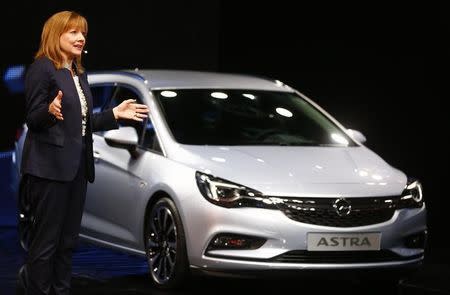Exclusive - GM to tap into connectivity, expand car sharing services: CEO
By Joseph White
DETROIT (Reuters) - General Motors Co Chief Executive Mary Barra said the automaker plans new efforts to capitalise on the connectivity built into its cars, expanding car sharing services, offering more autonomous driving features and enabling services through smartphone apps.
"Our goal is to disrupt ourselves, and own the customer relationship beyond the car," Barra told Reuters in an interview Monday ahead of a meeting with investors and analysts scheduled for Oct. 1.
Using technology embedded in its cars, she said, a customer who owns a Chevrolet Malibu could step into a Cadillac CTS and the luxury car could import from a smartphone app the driver’s preferences for how the car should function.
It would be "a hop, skip and a jump" for GM to offer broader car sharing services, she said. GM’s autonomous driving feature, SuperCruise, will also make use of high-speed data connections in cars when it launches next year.
Connectivity and apps will also help GM keep tabs on what customers are doing with their cars and how they are responding to features such as automatic braking or hands-free highway driving, Barra said. Companies such as Apple Inc and Google Inc are pushing to dominate dashboard displays with their software, but "we have the platform" of the vehicle itself, Barra said.
GM has moved more aggressively than most of its rivals to put high-speed, 4G LTE data connections in its cars.
"We sold more 4G LTE connected vehicles in three days in June than the rest of the industry did in the first half of the year," Phil Abram, GM’s executive director for connectivity said in a separate interview
GM forecasts that from 2014 to 2018 it will earn about $350 million before interest and taxes on connectivity related services – a rounding error on GM’s projected revenue. Barra said the value in connectivity will grow if GM can inspire customers to stick with its brands for life, and provide data GM can use to tailor features and services.
GM and many of its established rivals, including Ford Motor Co , BMW AG, Daimler AG and Volkswagen AG are under pressure to demonstrate they will not be left in the dust as companies with roots in the digital technology industry, including Apple and search giant Google Inc, electric car pioneer Tesla Motors Inc and ride-sharing power Uber try to reinvent transportation.
The threat from Silicon Valley, concern about rising regulatory costs in the wake of Volkswagen AG emissions scandal and economic uncertainty in China have combined to drive most auto stocks into the ditch this year. GM’s shares traded Monday about 12 percent below their $33 per share initial public offering price – despite Barra’s promise earlier this year to return $10 billion to shareholders in the form of buybacks and dividends through 2016.
Barra gets good marks from analysts and investors for delivering on the automaker’s profit targets so far – including maintaining a forecast of 9 to 10 percent profit margins in China despite rapidly decelerating growth in vehicle demand. Earlier this month, GM paid $900 million to settle a criminal probe of mishandled recalls, dispelling a dark cloud on its horizon.
Barra in the interview confirmed earlier forecasts of 9 to 10 percent profit margins in China, breaking even in Europe next year and completing the $5 billion in share buybacks by the end of next year.
"We think the market is not fairly valuing the progress GM has made," said Barclays analyst Brian Johnson. While he welcomed GM’s initiatives on autonomous driving and disruptive mobility, "we’re not sure that will move the needle on the stock price."
(Reporting By Joseph White and Paul Lienert; Editing by Bernard Orr)




